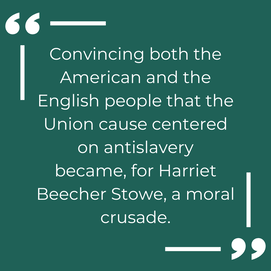 The Civil War was fought between 1861 and 1865. Ultimately, the main reason for the war was slavery, but it is important to remember that when the North entered the war, its only goal was to restore the Union. While Harriet’s novel, Uncle Tom’s Cabin, had stirred up anti-slavery opinions in the North and was one of the main contributing factors to the war, not everyone in the North was united against slavery. During the Civil War, another question was the involvement of European powers such as Great Britain and France, specifically Great Britain. Even though Queen Victoria had declared neutrality in the affairs of the United and Confederate States of America, many British citizens supported the Confederacy in the form of funds and other things. In fact, the majority of the Confederate fleet was produced in Britain. Intervention by the British was a serious threat to the Union. Prior to and during the Civil War, Harriet resolved to both spread and sustain anti-slavery ideas in the American and English populace. As the New England Quarterly writes, “Convincing both the American and the English people that the Union cause centered on antislavery became, for Harriet Beecher Stowe, a moral crusade.” Uncle Tom’s Cabin was published in 1852 (note that this is the completed book, as the story itself was first published in serialized form in the National Era). Uncle Tom’s Cabin spread anti-slavery ideas throughout Britain and the United States. Englishwomen were quite touched by Uncle Tom’s Cabin and recognized Harriet with respect and fame as she journeyed across Europe in 1853. In fact, these women were so moved by Harriet and anti-slavery that 562,448 women signed “An Affectionate and Christian Address of Many Thousands of Women of Great Britain and Ireland to Their Sisters, the Women of the United States of America”, also known as the Stafford House Address. In the Stafford House Address, which was written at one of the homes of the Duke and Duchess of Sutherland (Scotland), the women pledged their support and stated that slavery must be ended. Between 1853 and the outbreak of the Civil War, Harriet continued to write articles and even another novel against slavery. The novel was titled Dred: A Tale of the Great Dismal Swamp. She gained a column on the New York paper, the Independent. When war broke out between the United and Confederate States of America, Harriet saw the Civil War as a “holy crusade to emancipate the slaves,” Harriet saw the war as “part of the last struggle for liberty-the American share.” Harriet was very surprised when she found out that many English placed their support with the Confederacy. Few in Britain actually thought the war was about slavery. At the same time, most of the people in the Union did not think that the Civil War was to free the slaves. As a response to Confederate support in Britain, Harriet decided to write Lord Shaftesbury, a new supporter of the confederacy since playing a key role in the “Stafford House Address.” Harriet wrote of the North’s true goal, abolishing slavery. This letter was widely circulated. Her letter was met with a surprising amount of criticism in both Britain and the United States and failed to convince anyone of the abolitionist nature of the war. In 1862, Lincoln announced the preliminary Emancipation Proclamation, which was due to come into effect on January 1st of the following year. However, Harriet was still quite skeptical of Lincoln, especially after he removed General Frémont, who went above the law by freeing slaves without Lincoln’s approval. Harriet then decided to use the Proclamation as the basis for a “reply” to the Stafford House address. Around this time, Harriet went on a trip to Washington D.C, with a stop in Brooklyn to visit her brother. In Brooklyn, Harriet and her brother, Henry Ward Beecher, then asked Mrs. Lincoln (who was also visiting New York) if Harriet could meet the President while in the Capitol. Harriet did end up meeting Lincoln while in the capital. It was here that Lincoln issued the famous statement, “Is this the little woman who made this great war?” In this meeting with Lincoln, Harriet was assured of the President’s abolitionist devotion, and assured that he would sign the Proclamation fully. Harriet stayed in Washington for a little bit longer, completing her reply to the Stafford House Address. This was published in the Atlantic Monthly. Harriet’s “Reply” was quickly spread throughout Britain. While it was still criticized, the “Reply” managed to further convince the British that the Civil War was one against slavery. This, along with the Emancipation Proclamation, helped to further cement Britain’s further non-involvement in the war. On January 1st, 1863, Harriet attended a special concert to celebrate the signing of the Emancipation Proclamation. Post celebration concert, Harriet resolved to let Lincoln guide the war, since she had already spoken to the British. Harriet returned to “a quieter life.” She no longer wrote articles focusing on anti-slavery. Harriet stopped writing articles for the Independent, and instead wrote a few articles on domestic ideas for the Atlantic Monthly. She desired and wrote about the “talk of common things.” Harriet once again returned to writing novels and spending time with her family. All quotes are from The New England Quarterly, unless stated otherwise. Primary Source: Other Sources:
About the author:
Emmett Looman is a Youth Docent at the Harriet Beecher Stowe House in Cincinnati. He enjoys history and is always happy to learn new interesting facts about the past.
0 Comments
Leave a Reply. |
Archives
March 2025
Categories
All
|
|

 RSS Feed
RSS Feed